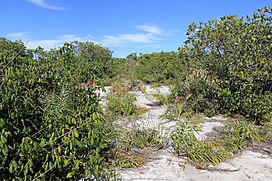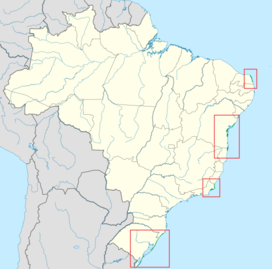Atlantic Coast restingas
| Atlantic Coast restingas | |
|---|---|
 Restinga vegetation in Jurubatiba Sandbank National Park | |
 location of the Atlantic Coast restingas | |
| Ecology | |
| Realm | Neotropical |
| Biome | tropical and subtropical moist broadleaf forests |
| Borders | |
| Geography | |
| Area | 7,557 km2 (2,918 sq mi) |
| Countries | Brazil |
| States | |
| Conservation | |
| Conservation status | Critical/endangered |
| Protected | 1,092 km² (14%)[1] |
The Atlantic Coast restingas is an ecoregion of the tropical and subtropical moist broadleaf forests biome, and the South American Atlantic Forest biome. It is located along Brazil's Atlantic coast, from the country's northeast to its southeast.
Restingas are coastal forests which form on sandy, acidic, and nutrient-poor soils, and are characterized by medium-sized trees and shrubs adapted to the dry and nutrient-poor conditions found there.
Setting

The ecoregion covers an area of 7,900 square kilometers (3,100 sq mi), and includes several well-defined enclaves that range along the Atlantic coast from Brazil's northeast to southeast, extending from the tropics to the subtropics.
The northernmost enclave is in Rio Grande do Norte state in northeastern Brazil. Other enclaves are north and south of the city of Salvador and near the mouth of the Jequitinhonha River in Bahia state; north and south of the mouth of the Rio Paraíba do Sul in Rio de Janeiro state; and along the coast of southern Santa Catarina state and Rio Grande do Sul state, as far as the Uruguayan border.
See also
- List of plants of Atlantic Forest vegetation of Brazil — flora of its diverse ecoregions.
- Ecoregions in the Atlantic Forest biome
- List of ecoregions in Brazil
External links
- "Atlantic Coast restingas". Terrestrial Ecoregions. World Wildlife Fund.
- (in Portuguese) CONAMA (1999) Resolução 07 de 23 de julho de 1996
References
You can help expand this article with text translated from the corresponding article in Spanish. (April 2019) Click [show] for important translation instructions.
|
- Atlantic Forest (biome)
- Ecoregions of Brazil
- Forests of Brazil
- Environment of Bahia
- Environment of Rio de Janeiro (state)
- Environment of Rio Grande do Norte
- Environment of Rio Grande do Sul
- Environment of Santa Catarina (state)
- Flora of Atlantic Forest (biome)
- Flora of Bahia
- Flora of Rio de Janeiro (state)
- Flora of Rio Grande do Norte
- Flora of Rio Grande do Sul
- Flora of Santa Catarina (state)
- Neotropical tropical and subtropical moist broadleaf forests
- Ecoregion stubs
- Brazil geography stubs
